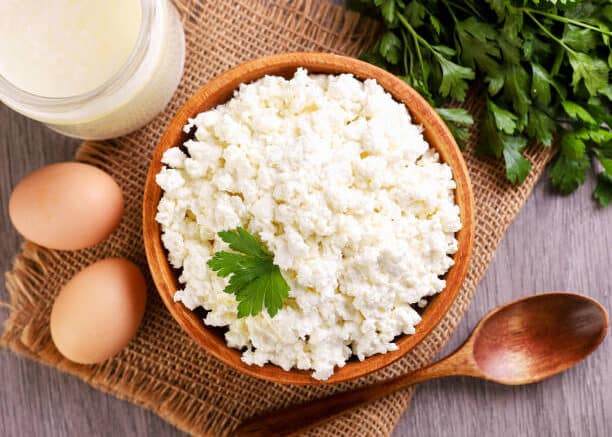Does Cottage Cheese Cause Gas?-Overview
Cottage cheese is made from the pear of cow’s milk, which can vary in fat.
The cottage cheese is formed through the addition of lemon, or vinegar to warm milk, the casein protein is separated from the liquid part of milk known as milk serum.
Once the milk is acidic, it is cut and cooked until the squeezer comes out, and then washed and liquidated to remove the squeezer.
This method allows maturation and aging processes to enhance its flavor, and compared to the aged cheese, it has a light flavor, as well as a white soft, a crustacean strength, and other ingredients may be added to give it flavor.
It should be noted that it is considered good diet food, contains a large amount of casein, has low calories, is a favorite food of bodybuilding athletes and can either be eaten directly or used in bread and salads.
Health Benefits of Cottage Cheese
Cottage cheese has many health benefits, including:
Reduces the probability of metabolic syndrome. cottage cheese reduces the likelihood of developing the syndrome in men, who suffer from diabetes, and who do not.
It is a group of diseases, including high blood sugar, which is a major problem for people with diabetes.
Make children active. This happens when they eat more dairy products such as cottage cheese daily; It’s also possible to add it to the diet of lethargic children.
Good source of calcium. Cottage cheese plays an important role in the prevention of osteoporosis, helps to regulate blood pressure, as well as its primary role in bone and dental health.
Helps boost weight loss. adding cottage cheese to the diet along with whole grains, vegetables, fruits, and vegetable oils can significantly affect weight loss.
Has a low glycemic index. This index measures the number of carbohydrates in the food, and how fast it raises the blood sugar level. Low-rated foods raise blood sugar more slowly and digest at a slower pace.
Contains selenium. It acts as an antioxidant, preventing cell damage, and preserving tissue health, and is good for people seeking a natural immune system booster, as well as for people with thyroid problems.
Help protect against insulin resistance. Daily dairy use may reduce the risk of developing insulin resistance in overweight people, and it should be noted that insulin resistance may lead to the development of type 2 diabetes in addition to heart disease.
What is the Nutritional Content of Cottage Cheese?
The value of the nutrients in the cottage cheese varies depending on the amount of sodium added, and the proportion of fat in the milk.
The following table shows the nutrients in 100g of cottage cheese:
| Content | Amount |
|---|---|
| Calories | 98 Kcal |
| Total Fat | 4.3 g |
| Saturated Fat | 1.7 g |
| Cholesterol | 17 mg |
| Sodium | 364 mg |
| Potassium | 104 mg |
| Total Carbohydrate | 3.4 g |
| Dietary Fiber | 0 g |
| Sugar | 2.7 g |
| Protein | 11 g |
| Vitamin C | 0 g |
| Calcium | 83 mg |
| Iron | 0.1 mg |
| Vitamin D | 3 IU |
| Vitamin B6 | 0 mg |
| Vitamin B12 | 0.4 µg |
| Magnesium | 8 mg |
Does Cottage Cheese Cause Gas?
Cottage cheese contains a low amount of lactose, and therefore, it is less likely to cause bloating and gas in your stomach and intestines.
If a few slices of cottage cheese make you feel bloated, you may have lactose intolerance, which means your body lacks the chemicals needed to break down lactose (the sugar found in cottage cheese).
This can result in the creation of gases in the Gastrointestinal tract, which can lead to bloating.
Advice to Getting Rid of Gases
The following are a few measures that help you to get rid of bloating and flatulence:
Stick with your daily meals regularly: 3 basic meals and 2 snacks.
Chew your food slowly and avoid talking to others in the process. The formation of gases may result from poor digestion and your ingestion of an excessive amount of air.
Exercise, because it helps you strengthen your abdominal muscles and enhance the contractions necessary for digestion.
- Don’t drink mineral water
- Avoid eating fresh vegetables such as cabbage as well as foods containing oatmeal and some juices, such as apple juice.
- Don’t consume large amounts of milk products because that leads to fermentation causing your intestines to swell.
See Also
Does Cheese Cause Constipation
References
https://www.ncbi.nlm.nih.gov/pmc/articles/
